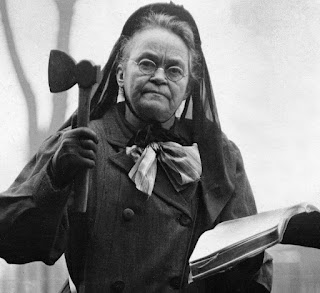 |
| Nicola Sturgeon yesterday |
The Scottish National Party has been fully captured by the temperance lobby. Minimum pricing has crashed and burned, but they are still listening to the alleged experts from the pressure groups whose wages they pay. Banning alcohol advertising was always next on the agenda for the Scottish temperance groups and the Scottish Government has produced a consultation document that reads like it was written by Carrie Nation.
I have been reviewing and practising alcohol related law in Scotland over some years, in my role as a licensing lawyer representing the trade, and I have written on this topic widely. I have often been a “critical friend” of the Scottish Government, having sat on many working groups and bodies on licensing reform, and must also concede I have been withering in my analysis of the efficacy of some of the licensing law which the Parliament has produced. That being, said even I am amazed at just how far these new proposals go, and the absence of balance.
“It is crucial that any potential restrictions to reduce the volume of alcohol marketing are as comprehensive as possible.”
Event Sponsorship
This part of consultation starts by telling us there is no evidence at all as to whether sponsorship of “events”, by which they mean music, cultural events and so on (as opposed to sporting events) by alcohol has negative outcomes. Nevertheless, unhindered by any expressed desire to wish to proceed with probative and proportionate policy-making, they plough on and ask whether there should be a prohibition on alcohol sponsoring all events across Scotland. This, if enacted, would end alcohol sponsorship of musical or cultural festivals as well as local community led events. Heaven knows how you organise a beer festival.
Brand-sharing and merchandise
Not content with proposing a complete ban on all alcohol advertising in all public spaces, and the shuttering of shop-fronts, they go further, and suggest that there should be a ban on the sale of all alcohol-branded merchandise altogether. No more hats or mugs. No more t-shirts. No more craft brewery hoodies. In the context of this consultation, these have become “walking billboards“. The Scottish Government go further still, and present a case that even alcohol-free products should be banned as they are, in essence, “gateway” brands to expose people to the alcoholic variants, because of the use of the same names and logos:
“This demonstrates the need to carefully consider restricting these other distinctive and identifiable elements associated with the alcohol brand, in addition to restricting use of the alcohol brand name.“
... Perhaps the most incredible proposal within this consultation is the suggestion that there should be a complete ban on any and all promotion/advertising of alcohol in public places. This notion is suggested not, it would seem, as an intrinsic goal, but on the basis that it might be quite difficult to create a more nuanced law. Consider the following paragraph:
“Given the difficulties around defining places as places children and young people frequent, as well as the likely impact of alcohol marketing on adults too, a prohibition of alcohol advertising in public spaces may be the best course of action.”
I find that to be a remarkable statement. Here we have the Government saying that, because it might be too complex to prohibit alcohol marketing under defined circumstances, they should just go ahead and ban it altogether. We are looking at the white-washing of the alcohol industry across the country.
... Hard-working alcohol producers will be vexed, I would suggest, to see the following comment:
“Without branding and other marketing strategies, alcohol products in each beverage sub-sector are essentially variations of the same thing“.
This is an overt effort to eradicate the diversity and personality of individual alcohol products; to reduce them to a denominator common to those who are so opposed to it; that is, to see alcohol only as a harmful commodity, a vice. This one sentence discounts centuries of craft, effort and enterprise. This one sentence discounts the joy in sampling one malt whisky over another and sharing that experience with a friend. These, of course, are positive traits and experiences, which explains their absence.
... They even take us into territory where alcohol must be seen in the same context as tobacco:
“Where alcohol is displayed behind the checkout this could be required to be in a closed cupboard, like tobacco products.”

No comments:
Post a Comment